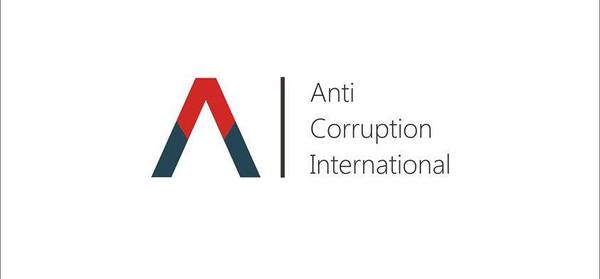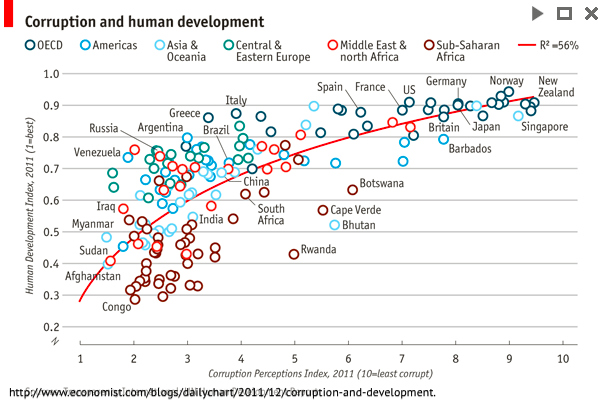
or why corruption does not benefit an economy

By Lisa Mansfeld, head of external relations & media Anti Corruption International Germany and member of the TC development. This piece by Anti Corruption International is a part of the Pitching Europe Partnership with Campus Europe.
Although there are still people who stick to the view that corruption in some cases “greases the wheels” theory, as well as empirics, reveal the opposite of this perspective. Most economists consider corruption to be a major obstacle to development as it is partly responsible for low income-levels and helps to generate so-called poverty-traps.
What is the “greasing the wheels hypothesis”?
The “greasing the wheels hypothesis” states that corruption “facilitates beneficial trades that would otherwise not have taken place” (Aidt, 2009). Doing so, private enterprises could correct pre-existing market inefficiencies caused by the government. This could lead, for instance, to speeding up bureaucratic processes. If this were the case, then we could define corruption as being efficient and there exists some anecdotal evidence to support this view. For instance, De Soto (1990) finds that in Lima, many entrepreneurs stayed in the informal sector or paid “speed money” in order to become legal. This is because it simply takes entrepreneurs too long (the costs are too high) to become legal. In general, however, this theory withstands neither theoretical nor empirical examination.
Why can corruption not grease the wheels?
There is no such thing as efficient corruption. Distortion that, following the “greasing the wheels hypothesis” can be overcome by corruption, are actually put in place and maintained by government officials precisely because of their “corruption potential” (see Aidt, 2009). As long as corrupt politicians can benefit from such inefficiencies, they will not eliminate them.
This has been proved by Djankov et al. (2002): They found a strong correlation between the number of procedures start-ups must go through in order to become legal and (perceived) corruption levels. Regulations are kept in place in order to ensure income from bribes.
Another fallacy of this theory is that in the process of corruption entrepreneurial talent is misallocated. This is because the jobs of those politicians or government officials that can benefit from corruption are questionable. Therefore, these people spend high amounts of resources on maintaining their jobs (see Aidt, 2009). Without corruption, they could spend more money, time and energy on their actual tasks.
This inefficiency can also be seen when looking at current data.
S. Aidt (2009) found a strong negative correlation between growth in genuine wealth per capita and corruption. He used genuine wealth instead of GDP in order to focus on sustainable development, not only on economic growth. A negative correlation means that the higher the level of corruption, the lower genuine wealth (and vice-versa – a negative correlation does not establish the direction of the effect).

corruption-hd
http://www.economist.com/blogs/dailychart/2011/12/corruption-and-development.
The economist published a very informative graphic showing the positive relation between high levels of human development and low levels of (perceived) corruption.
Rich countries such as New Zealand, Singapore and Norway show low levels of perceived corruption, whereas countries with high levels of perceived corruption like Congo and Afghanistan face low levels of development.
There is also an interesting report by OECD on corruption. They state that: “Estimates show that the cost of corruption equals more than 5% of global GDP (US$ 2.6 trillion, World Economic Forum) with over US$ 1 trillion paid in bribes each year (World Bank).” US$ 2.6 trillion. This is a number we can hardly imagine, and is more than the GDP of Brazil in 2014.
We cannot neglect such findings. There is no doubt about the negative consequences of corruption. Let´s do something against it.
ANTI CORRUPTION – it starts with YOU
- Articles and Blogs
- EU Foreign Policy
- Eurocrisis
- Geen categorie
- Partnerships
- Pitching Europe
- Uncategorized

 The geopolitical role of the Sahel: the influence of the EU and other Great Powers in the Malian crisis
The geopolitical role of the Sahel: the influence of the EU and other Great Powers in the Malian crisis  Is Nuclear Disarmament Still a Dream? The Third Meeting of State Parties in Perspective
Is Nuclear Disarmament Still a Dream? The Third Meeting of State Parties in Perspective  Strategic Saboteur: Hungary’s Entrenched Illiberalism and the Fracturing of EU Cohesion
Strategic Saboteur: Hungary’s Entrenched Illiberalism and the Fracturing of EU Cohesion  The invention of development: power, narrative, and the afterlife of Truman’s speech
The invention of development: power, narrative, and the afterlife of Truman’s speech 


